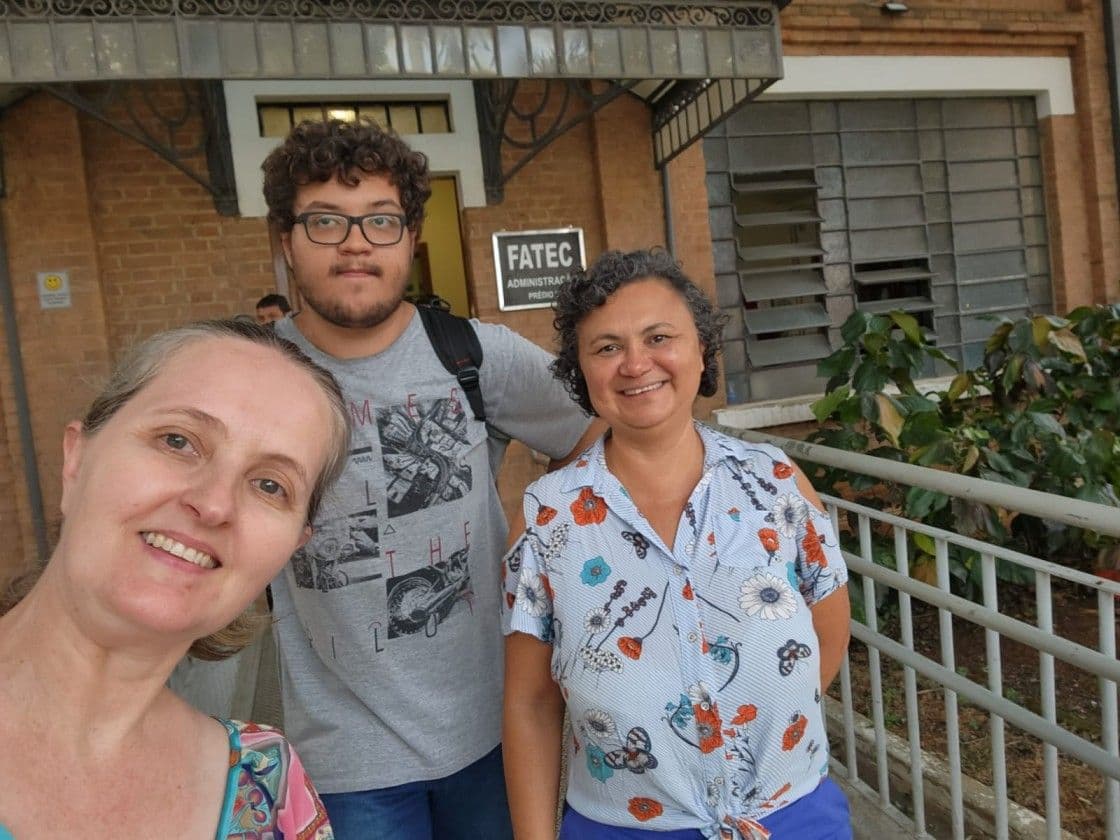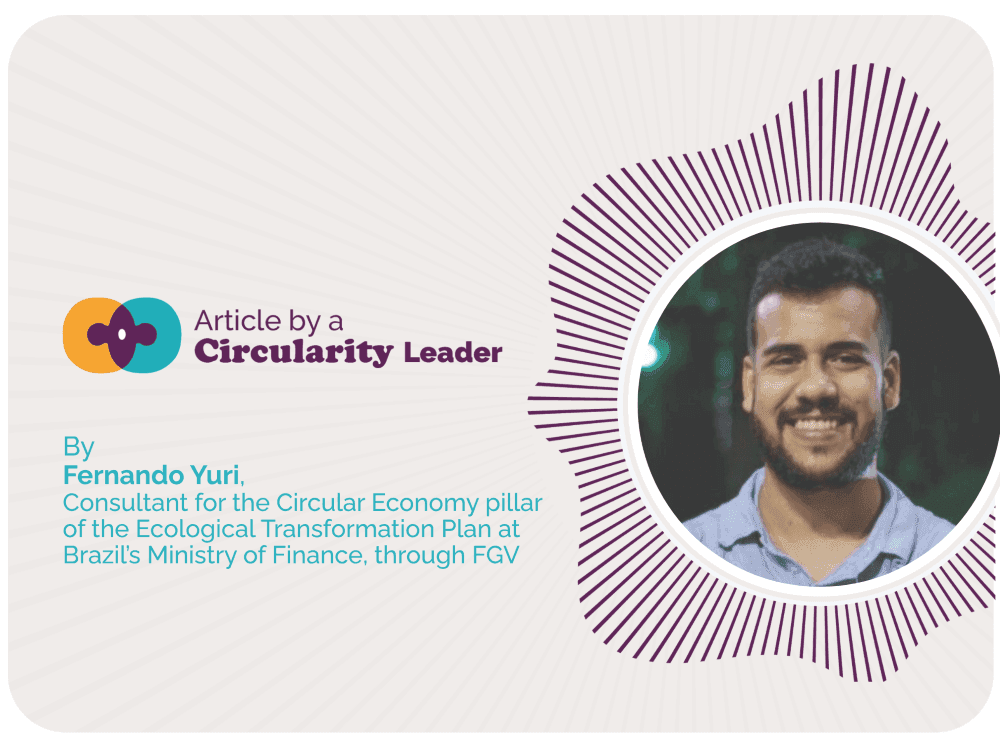
01/12/2023
Coloring the future in a circular way
By Arlene Carvalho, from the Circular Movement
Coloring cities sustainably, generating income, and avoiding waste—this is the mission of the Banco de Tintas (Paint Bank) project from Jundiaí, Sao Paulo, Brazil. The initiative secured first place in the Circular Challenge 2023, organized by the Circular Movement.
Developed by a teacher and three students from the Environmental Management course at the Faculty of Technology - Deputado Ary Fossen, Fatec Jundiaí, the project is already considered an example of innovation, sustainability, and circularity. In addition to winning the competition, Banco de Tintas became one of the finalists in the 1st international edition of the Award for a World Without Waste, scheduled for December 2, where it will compete with projects from all over Latin America.
As an additional prize, the project creators also received mentoring from Circular Movement experts to further develop this idea. Banco de Tintas aims to transform waste into resources in the pursuit of a more circular future.
The project proposes the creation of a Paint Bank in Jundiaí to connect donors of unused commercial paints with people who need them—avoiding improper disposal and assisting families in situations of social vulnerability. The community can participate by donating paints and using a website or app to inform about their paint needs.
 Image: Thiago Egg/Circular Movement
Image: Thiago Egg/Circular Movement
"Eureka" Moment
The idea emerged in 2019 during a water resources class taught by Professor Ana Carolina Veredas. During the classes, students intensely discussed water pollution, especially related to the improper disposal of water-based and solvent-based paints. After numerous discussions, the idea of Banco de Tintas was conceived.
"We wanted a solution to pollution, but often we depended on other people, institutions, and so on. The idea of the bank was a Eureka moment. The proposal was to have a place to store paint residues and allocate them to those in need, who cannot afford the cost of a whole can or simply won't use it entirely. It would be a way to reduce or eliminate water pollution," explains Veredas, the project mentor.
Although "Banco de Tintas" was not implemented at the time due to the COVID-19 pandemic, this year, a former student sent an Instagram post about the Circular Challenge to the professor. "She wasn't even part of the 2019 class, but she sent it to me. Upon reading the regulations, I realized that the project didn't need to be in operation yet; it could be an idea. That's when I decided to resume the project," she continues.
The professor mentioned that she had already discussed the idea with the institution's coordination, but winning the Circular Challenge made the conversation and path-opening easier. "It's encouraging to move this forward because it's a very effective, low-cost social technology, easy to implement, and can be replicated anywhere. Many people sometimes have good intentions, but there's a lack of proper reverse logistics to actually absorb this waste. It depends much more on the human factor than financial," emphasizes the professor.
 Image: Thiago Egg/Circular Movement
Image: Thiago Egg/Circular Movement
The professor gathered some students willing to drive the project, including Adriana Santana, Fellipe Cunha, and Lucas Santiago, all in the 4th semester of the course, who now proudly celebrate the awarded prize. Fellipe and Adriana even have a project for the production of natural paints and were already familiar with paint pollution. Like Fellipe, Lucas is also skilled in video editing, which helped the team in executing the Circular Challenge.
Cunha emphasizes that the main motivation to embrace the idea is precisely its potential for application. "If we can implement this, it will be extremely beneficial. We are giving a new purpose to a resource that would otherwise be forgotten or discarded. Before the challenge, we had already heard about Circular Economy concepts and the importance of 'everyone doing their part' in waste and material recycling, such as aluminum, for example. The notion that waste has value was already present in our perception".
For Santana, the Circular Economy has long been present in everyday life, especially when it comes to paints: "When I need it, I always buy water-based paints. The Circular Economy attracts me a lot because many times, we buy something, leave it there, and often forget, only to discard it improperly later. We are contributing to the environment naturally, paying attention to what makes up the product. And the bank comes to close this waste cycle. Managing this type of waste properly is challenging."
"Circular Economy is not just a concept but a practical and efficient approach to transforming how we produce, consume, and discard resources. It involves reuse, recycling, material recovery, promotes the regeneration of natural systems, and creates economic opportunities. The Paint Bank exemplifies how this approach can positively impact, connecting people with surplus paints to those in need, reducing waste, and promoting resource sustainability. This motivated me," Santiago reports.
 The entire project team. Photo: Reproduction
The entire project team. Photo: Reproduction
In fact, Santana has a long history with the philosophy of banks, as the advisor defines it. "Her daughter is a fashion designer and works in a fabric bank in São Paulo. The philosophy of banks is beautiful," Veredas recalls. "My daughter started buying fabrics from this bank to save on models made for college, and talking to the owner, she ended up getting an internship and now works there," Santana says.
Fellipe and Adriana even have a project for the production of natural paints and were already familiar with paint pollution. Both projects run in parallel.
"Another thing that aligns with all of this is our project for making paints. We wanted to help the environment and created clay-based paints. We presented at a recent fair here at Fatec, and now we are developing more tests to expand the colors, etc.," says Santana.
And when will the bank be operational?
"The forecast is that the project will start operating in the first semester of 2024, in the most optimistic outlooks. The coordinator of the Analysis and Systems Development course (ADS) at the institution is expected to** create a dedicated space on the Fatec website for registrations and monitoring of paint quantities**," comments Veredas.
A place to store the paints is also needed. According to the professor, she hopes it will be a compact space, initially. "It would be here at Fatec, that's why we only accept water-based paints—solvent-based paints pose a risk to those who handle them and cannot be handled in the wrong way. We want to start on a smaller scale, and who knows, with the prize, someone might come forward to help us?" she concludes.
In summary, the Banco de Tintas project, winner of the Circular Challenge 2023, not only stands out as an innovative and circular initiative but also as a real commitment to the Circular Economy and waste reduction. It remarkably illustrates the ability to transform waste into valuable resources. Under the leadership of Professor Ana Carolina Veredas and her dedicated students, the team is preparing to implement this visionary proposal, aiming for a positive impact on the community and the environment. This project marks the beginning of a more conscious and sustainable cycle, and we will be attentive to its inspiring progress.

